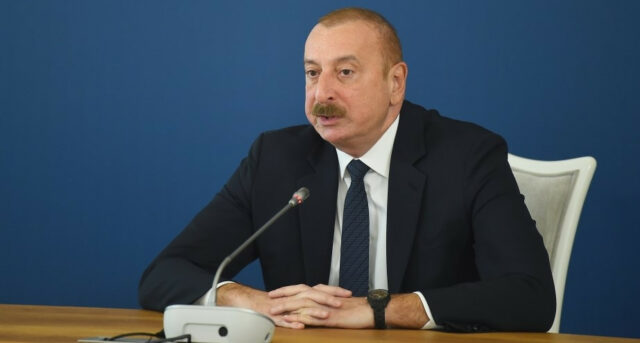
Baku’s Cooperation With West on Ukraine Leaves Moscow With Few Options
Publication: Eurasia Daily Monitor Volume: 20 Issue: 73
By:

On May 3, speaking at an international conference in Shusha on “The Formation of the Geopolitics of Greater Eurasia: From the Past to the Present and Future,” Azerbaijani President Ilham Aliyev announced that “having become a military ally of Turkey, Azerbaijan has indirectly become, to a certain extent, a military ally of NATO [North Atlantic Treaty Organization].” Moreover, he stressed, Baku has done this not by seeking membership in the alliance—something others in the region have done without success—but by means of a series of bilateral agreements with key Western countries. “That is,” Aliyev continued, “we always have chosen in favor of practical steps rather than declarations which later may turn out not to give visible results” (Mediamax.am, May 4). The Azerbaijani leader’s words, because they imply that he views Azerbaijan as a member of the Western alliance in all but name, will further infuriate many in Moscow and turn up the pressure on the Kremlin to respond both politically and militarily to Baku’s support of Ukraine by suggesting that the Azerbaijani effort is part and parcel of a larger anti-Russian move by NATO and Israel. If, as seems likely, the Kremlin decides that it cannot respond forcefully because of other concerns, including Moscow’s role in the South Caucasus, that will only further enrage many in Moscow because it will highlight how the war in Ukraine has exacerbated Russia’s declining influence and power south of the Caucasus Mountains.
Even before Russian President Vladimir Putin launched his expanded war of aggression against Ukraine in February 2022, Azerbaijan has been quite visibly in Kyiv’s corner. Five weeks before Moscow acted, Aliyev visited Kyiv and signed a joint declaration committing the two countries to “mutual support for the sovereignty and territorial integrity of the two states within their internationally recognized borders” and “a readiness to intensify cooperation in fighting hybrid threats and further strengthening cooperation in the field of defense industry by completing current and developing new joint projects” (Kp.ua, January 14, 2022; see EDM, January 25, 2022; February 9, 2022; Caliber.az, March 11). Moscow was not happy about this, but it at least understood that Baku could hardly question any country’s territorial integrity given the focus on defending its own. In the months since, however, the Russian government has become increasingly alarmed about Azerbaijan’s supply of weaponry to Ukraine (Vpoanalytics.com, April 27).
These concerns had come to a head even before Aliyev’s statement in Shusha. Over the past year, reports have trickled out about Azerbaijani weapons going to Ukraine—including covertly as part of Baku’s widely reported “humanitarian assistance” to Ukraine (Caliber.az, March 11; Vpoanalytics.com, April 27). And then, two weeks ago, a large Azerbaijani parliamentary delegation visited Kyiv to work out the details for further military cooperation. This meeting alarmed some in Moscow as it came on the heels of Azerbaijani meetings with defense officials in Washington and reports about Baku’s expanding cooperation both with Turkey and Israel. These two countries in turn could be expected to use Azerbaijan to supply Kyiv with aid, and such sessions could open the way to further cooperation between these countries and Azerbaijan in providing assistance to Ukraine (Kommersant, November 24, 2022; Vpoanalytics.com, April 7, 8; Trend.az, April 14; Iarex.ru, May 1).
Russian officials, who risk the reduction of Moscow’s influence in Azerbaijan still further by any open criticism, have gone silent, as has most of the Russian government–controlled media. This pattern has infuriated those in the Russian capital who see Azerbaijan slipping into the West’s orbit and becoming a cat’s paw for NATO, not only in Ukraine but also against the territorial integrity of the Russian Federation. And such Russian commentators are demanding that the Kremlin recognize the threat that Baku’s actions represent and take action against Azerbaijan regardless of what that might mean for the Caucasus region, due to the far larger equities that are involved as far as Russia is concerned (Dzen.ru, April 23).
Given the difficulties Russian forces are facing in Ukraine, one nonetheless might have reasonably expected Moscow to lash out at Azerbaijan for supporting Ukraine both directly through shipments of its own arms and energy as well as indirectly as a transit route for arms from NATO and Israel. But the Kremlin’s options are far more limited than many assume. Any sharp criticism of Baku by Russian officialdom would be unlikely to change Azerbaijan’s, let alone NATO’s or Israel’s, course and that in turn would only highlight Moscow’s loss of leverage not only in the Caucasus but across the whole post-Soviet space as well. Most immediately, it would radically reduce Russia’s ability to be a player in peace talks between Armenia and Azerbaijan, raise questions in Tehran about Moscow’s utility as an ally of Iran in the region and represent yet another critical case of collateral damage from Putin’s expanded invasion of Ukraine.
At the same time, however, the rising tide of criticism from Russian defense industry commentators about the failure of the Kremlin to do something will likely force Moscow in the coming days, especially after Aliyev’s statement yesterday, to issue some sharp criticism of what Azerbaijan and its partners have been doing. That is the minimum the Kremlin’s critics expect; but if Moscow does no more than that, the attacks against the Putin regime’s policies on Azerbaijan, Ukraine and the West will not lessen, which may lead to even broader attacks on the Kremlin’s leadership.
In short, official Moscow has few good options: If it does nothing, it will look weak. If it makes statements that do not make an impact, it will look weaker still. But if it tries to do something more and fails, that would almost certainly have a more negative impact on Moscow’s standing across the region and the Kremlin’s standing within the Russian defense community, a sector that has been among his strongest supporters up to now.



